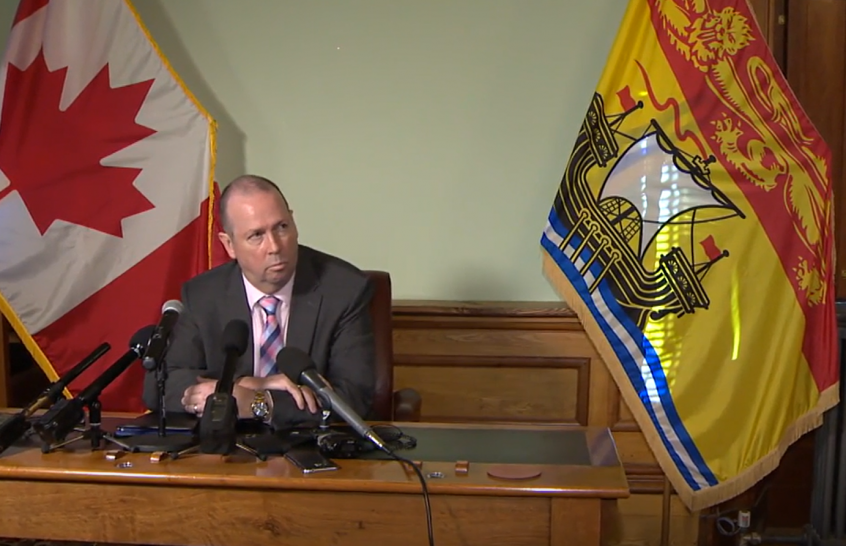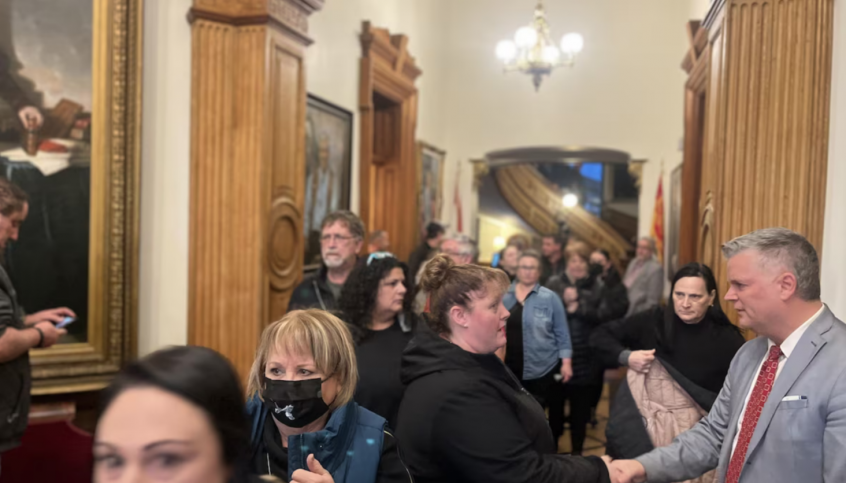Join us for the 2 last tour stops of the 2024 Mass Membership Meetings. Don’t forget, there is also a rally for workers’ rights planned in Fredericton on May 1st!

NB Budget 2024: Missed Opportunities Leave New Brunswickers Behind
March 19, 2024 – The Canadian Union of Public Employees (CUPE) New Brunswick expressed disappointment with the provincial budget unveiled today.
“This budget is a missed opportunity to address the pressing needs of New Brunswickers,” said Stephen Drost, President of CUPE NB. “This is a budget where the current government is packing up and is looking at the exit door. We are surprised just how little was invested in healthcare, education, social development while the urgent needs are growing so much and our communities challenges are compounding” he added.

NB Budget 2024-2025
CUPE NB highlights several areas of concern:
- Underinvestment in Healthcare: Despite repeated calls from medical professionals and unions, the healthcare budget falls short of addressing staffing shortages and improving patient care.
- Stagnant Wages: The government’s attempt to suppress wage expectations disrespects hardworking public sector employees who are facing rising costs of living.
- Education Funding: While additional funding for student enrolment is positive, it does little to address crumbling infrastructure or support educators and support staff facing increased workloads.
- Long-Term Care Crisis Ignored: The budget offers no solution to the ongoing crisis in long-term care facilities, particularly the non-profit nursing homes, which represent the majority of long-term care establishments. Wages remain very low in this sector and the province has not shown real willingness to address this.
A Glimmer of Hope on Housing:
CUPE NB acknowledges the creation of a dedicated budget line for housing and increased investment in the New Brunswick Housing Corporation. 60 million more in this budget line is good news. Yet, this is a far cry from what the province must do to improve housing access. No announcements were made regarding tenant protections and preventing the loss of currently affordable housing stock from being converted into high-profit rentals and condos. CUPE NB is saddened to see how this government has not made public affordable housing a major part of its plan to address the province’s affordable housing crisis.
CUPE NB calls on the government to:
- Deal with the staffing crisis in public services like healthcare, education, social services, and long-term care.
- Respect the collective bargaining rights of public sector workers and dedicate funding to help workers deal with cost of living pressures.
- Develop a comprehensive plan to address the affordable housing crisis, which disproportionately hurts working families, seniors, and lower-income residents.
Auditor Investigation in Costly Private Health Staffing Contracts Should Go Beyond Nursing
Fredericton, NB – CUPE salutes Auditor General Paul Martin’s investigation into the management of private agency nursing contracts in New Brunswick. This is why CUPE Local 1252 (representing over 9,000 healthcare workers in NB), along with the NB Council of Nursing Home Unions (over 4,400 long-term care workers) are demanding a broader inquiry into other facets of healthcare privatization.
While the spotlight has been primarily on the substantial costs associated with travel nurse contracts, CUPE asserts that privatization extends far beyond this aspect. Notably, private resident attendants’ roles are also being outsourced instead of being handled in-house, leading to significant financial burdens for New Brunswick residents.
“This investigation into travel nurse contracts merely scratches the surface of a much larger issue of systemic privatization,” asserts Norma Robinson, President of CUPE 1252. “We must address the pervasive practice of contracting out, which has become alarmingly prevalent within both Horizon and Vitalité, due to years of mismanagement by provincial governments. The problems extend beyond the staggering financial costs; it’s about accountability, transparency, and ensuring the highest quality of care for all New Brunswickers,” said Robinson.
In a letter addressed to Auditor General Paul Martin on March 7, 2024, CUPE locals have formally requested to expand the scope of his investigation. “We commend his proactive stance and stress the necessity for a thorough examination of procurement processes, oversight mechanisms, and the overall impact of these costly contracts on healthcare delivery,” said Sharon Teare, President of the NB Council of Nursing Home Unions.
“Millions of dollars are being siphoned out of our province, while the existing workforce fails to receive adequate support from the government,” highlights Trent Snikkers, CUPE Servicing Representative. “This government must prioritize public healthcare instead of profit-driven short-term fixes,” he concluded.
Fighting the unconstitutional Bill 17 : Injunction hearing scheduled in March 2024
Three CUPE groups (Locals 1253, 2745, and the NB Council of Nursing Home Unions) formally launched a legal challenge against the PC’s pension bill. Bill 17 breaks signed contracts and violates the fundamental rights of workers to fair collective bargaining. Read our Notice of Action and our Statement of Claim filed with the Court of Kings’ Bench below
 Loading...
Loading...
Urgent Concerns Ignored in Premier Higgs’s State of the Province Address
Fredericton, NB – Today, CUPE NB and provincial local leadership held a press conference in response to Premier Blaine Higgs’s State of the Province address, which was delivered Thursday night in Fredericton.

CUPE NB Press Conference – Friday, January 26, 2024
“Despite record surpluses, the PC government’s negligent policies have created a perfect storm, leaving workers, seniors, rural residents, young families, and numerous others grappling with substantial challenges’” said Stephen Drost, President of CUPE NB, which represents over 27,000 unionized workers. “We expected the Premier to come clean and admit that he has much to do to help residents, communities, and workers. That did not happen,” said Drost. “Instead, he thinks he can buy working families’ votes by mailing them a one-time $300 cheque. This barely scratches the surface of the damage he has done to low-income families, from his insistence on low wages in bargaining to his removal of rent protections,” said Drost.
Healthcare was among the pressing issues the Premier mentioned, yet, he has not said he would end his reliance on private agencies like Medavie and travel nurses. “He thinks the number one priority is the digitization of medical files, while we have critical understaffing and underpayment in care, particularly the nursing home sector, which worsens the healthcare crisis,” said Drost. “The province must first stop the bleeding. This requires direct funds to help workers and improve the public services all residents need,” he added.
Education and child welfare, essential pillars of our society, are also in jeopardy. The slow progress in building new school spaces, coupled with staff shortages affecting cleanliness and transportation, reveals a lack of commitment to our children’s future. “Social services, including child protection units, are understaffed, compromising the care for our most vulnerable citizens,” said Drost.
Workers’ rights and wages are consistently disrespected, with below-inflation wage growth for the majority. Premier Higgs’s government’s approach of imposing contract changes through legislation erodes collective bargaining rights, as seen in the glaring example of Bill 17.
CUPE NB notes how the lack of rent protection intensifies the struggle for affordable housing, affecting workers across the income spectrum. Let’s not forget how NB has one of the lowest minimum wages and among the weakest consumer rights protections in Canada. “This all compounds the challenges faced by residents,” said Drost. “More than ever, we need a government ready to invest in the well-being of those contributing to the province’s prosperity: working people,” he concluded.
2024 Maritimes Education Weeklong School
From March 18th to March 22nd, you will discover a diverse range of workshops designed to enhance your skills, knowledge, and professional development. This workshop will be held in Moncton as it is a central location for most participants.

From empowering leadership strategies to effective communication techniques, we have workshops tailored to meet your needs. Join us as we embark on a weeklong of growth and learning.
Explore our calendar and secure your spot today!
- 2024 Maritimes Education Weeklong School Brochure BIL-2
- Payment Registration Information (attach to cheque)
NOTE: During our event, a Hospitality Room will be available every evening from Monday to Thursday.
Additionally, for those seeking a refreshing outdoor experience, take advantage of the free outdoor skating rink conveniently located just across the street from the hotel. Don’t forget to pack your skates for a delightful time on the ice.
CUPE Mass Membership Meeting: Dec 21
All CUPE members in NB are invited to attend one of the 3 online mass membership meetings, this December 21st. No registration is required.
This meeting concerns Bill 17 and conservatives breaking signed contracts. Below are the links for each session. Please share with your colleagues:
CUPE Mass Membership Meeting: Dec 21, 10am https://encoreglobal.zoom.us/j/96869711598?pwd=Vk1JT3ZQOSs4a21icE4rVXFVVksvdz09
CUPE Mass Membership Meeting: Dec 21, 5 pm https://encoreglobal.zoom.us/j/92130356351?pwd=dUVaRHJGYjh5anJFanNublJLZ0dDdz09
CUPE Mass Membership Meeting: Dec 21, 7 :30 pm https://encoreglobal.zoom.us/j/99992988446?pwd=WDJrYkdBbTcxM3FMWmIrTHJVOGtHQT09
 Loading...
Loading...
Watch the recording of our “Pensions, Free Collective Bargaining and Bill 17” webinar
Voici notre webinaire bilingue sur “Les régimes de retraite, la libre négo collective et le projet de loi 17”.












